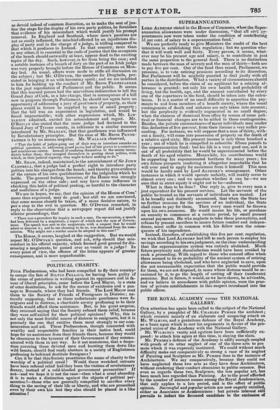SUPERANNUATIONS.
LORD ALTRORP stated in the House of Commons, whets the Super- annuation allowances were under discussion, "that all civil ap- pointments now were taken under the condition of contributing 5/. per cent. of salary to a superannuation fund." We are perfectly ready to give Ministers the credit of the best intentions in establishing this regulation ; but we question whe- ther it will work well and fairly. Every person, it seems, what- ever may be his present age and salary, is to contribute in just the same proportion to the general fund. There is no distinction made between the man of seventy and the man of thirty—both are to pay five per cent. Out of the fund thus raised, Parliament, we presume, is to vote retiring pensions according to its discretion. But Parliament will be mightily puzzled to deal justly with all parties in the distribution. What a variety of circumstances should be considered, before the claim of an applicant for a retiring al- lowance is granted: not only his own health and probability of living, but the health, age, and the amount contributed by every one of the copartners in the fund, should be taken into the calcu- lation. It is a matter of no small difficulty to apportion the pay- ments to and from members of a benefit society, where the usual contingencies of death and sickness are only taken into account; but the perplexity is evidently augmented in no small degree, when the chances of dismissal from office by reason of some poli- tical or financial changes are to be added to those contingencies. Besides, the private circumstances of many individuals may render this deduction of five per cent. from their income a very unfair pro- ceeding. For instance, we will suppose that a man of thirty, with- out a family, will come into possession of property on the death of a relative aged sixty. His present income is only three hundred a year ; out of which he is compelled to subscribe fifteen pounds to the superannuation fund: but his life is a very good one, and it is out of all probability that he would be superannuated before the death of his aged relative. Meanwhile, his contributions would be supporting his superannuated brethren for many years ; his own future prospects rendering it altogether improbable that he will ever need to apply for assistance from it himself. This man would be hardly used by Lord ALTHORP'S arrangement. Other instances in which it would operate unfairly, will readily occur to almost every one ; and we question whether it can be—we are sure that in strict equity it ought not to be—enforced.
What is then to be done? Our reply is, give to every man a just equivalent for his present services. Let the servants of the public be treated as the servants of individuals are treated. Let it be broadly and distinctly announced, that when the State has no further occasion for the services of an individual, the State shall cease to pay for them. Then every man would be thrown upon his own resources. He would insure his life, or purchase an annuity to commence at a certain period, by small present annual payments. He who neglects to take these precautions, and refuses by present sacrifices to insure future comfort and indepen- dence, must suffer in common with his fellow men the conse- quence of his imprudence.
Instead, therefore, of establishing this five per cent. regulation, we wish that Lord ALTHORP had left to each person to employ his savings according to his own judgment, on the clear understanding that the superannuation system was entirely abolished. Much future perplexity and dissatisfaction would have been avoided by such a proceeding. With regard to those who entered office when there seemed to be no probability of the ancient system of retiring allowances being abolished, and who have neglected to save, upon the not unreasonable expectation that the public would provide for them, we are not disposed, in cases where distress would be oc- casioned by it, to go the length of cutting off their (moderate) pensions. But in future, it would, as we have shown, be advisable, and we believe in accordance with public opinion, were the prac- tice of private establishments in this respect introduced into the public offices.
















 Previous page
Previous page